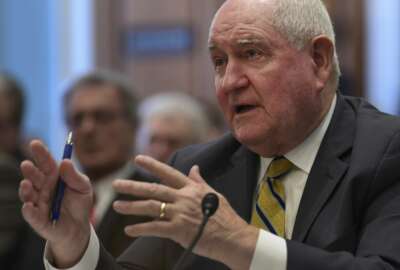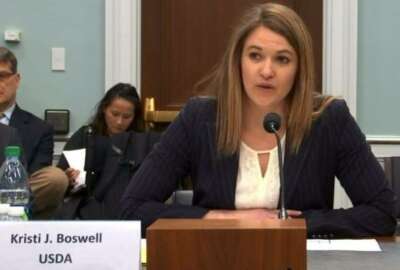
USDA relocation proposal faces more congressional backlash
As employees at the Agriculture Department await word of a final site decision, more members of Congress are taking steps to try to block the proposed USDA...
Best listening experience is on Chrome, Firefox or Safari. Subscribe to Federal Drive’s daily audio interviews on Apple Podcasts or PodcastOne.
As employees at the Agriculture Department anxiously await for word of a new location for the Economic Research Service and National Institute of Food and Agriculture, more members of Congress are taking defiant steps to try to block the proposed relocation.
USDA Secretary Sonny Perdue in early May said the department was considering multiple sites in Indiana, the Kansas City region, and North Carolina’s Research Triangle as “finalists” for the planned relocation of most ERS and NIFA employees.
An announcement from USDA was expected last week and is supposed to be imminent.
Yet the House Appropriations Committee included no funding for the proposed USDA relocation in its 2020 bill, which members passed earlier this week.
The department has “flatly refused numerous requests from this committee and other members of Congress to provide the initial cost benefit analysis that preceded the decision to go ahead with the proposal,” a report on the agriculture appropriations bill reads. “The committee believes that the department’s proposal puts that mission at risk, and the committee has therefore included bill language to prevent it.”
Standalone legislation in both the House and Senate would also prevent the proposed USDA relocation from moving forward.
A group of eight Senate Democrats, including Maryland Sens. Chris Van Hollen and Ben Cardin, along with Virginia Sens. Tim Kaine and Mark Warner, have introduced the Agriculture Research Integrity Act. The bill would bar USDA from moving ERS and NIFA out of the national capital region and would prevent ERS from moving under the department’s Office of the Chief Economist.
“USDA is proposing to uproot more than 700 hardworking federal employees from the national capital region with no cost/benefit analysis and no obvious public benefit,” Kaine said in a statement. “These federal workers will be forced to sell their homes, take their kids out of school and move across the country to a location to be determined. This suspicious process is currently under investigation by the USDA Inspector General. Until USDA gives Congress and its own employees some straight answers, this move should be stopped.”
Rep. Chellie Pingree (D-Maine) has introduced a companion bill in the House.
Meanwhile, the ranking members of three Senate committees are also seeking more information about the proposed moves. Senate Environment and Public Works Committee Ranking Member Tom Carper (D-Del.), Homeland Security and Governmental Affairs Committee Ranking Member Gary Peters and Agriculture, Nutrition and Forestry Committee Ranking Member Debbie Stabenow (D-Mich.) sent Perdue and General Services Administrator Emily Murphy an extensive letter on Wednesday asking for more information about the proposed move.
Specifically, they wanted to know what role GSA has and will play in USDA’s plans to relocate the two components.
They also questioned the impact USDA’s relocation would — and is already having — on the agency’s workforce. ERS, the senators said, already has a 20% vacancy rate with 66 open positions, while NIFA has a 26.4% vacancy rate with 88 open positions.
“USDA’s own estimates are that as many as 50% of existing ERS and NIFA staff would leave the agency instead of relocating,” the senators wrote in a June 5 letter.
Multiple attempts to block the proposed USDA relocation came as a House Agriculture subcommittee met Wednesday to hear from witnesses who said they would be impacted by the move of ERS and NIFA.
All three witnesses, which included a farmer, as well as an administrator and professor at two land-grant universities, opposed the possibility of relocation.
“I come to Washington a lot. I come to meet with my federal partner, NIFA,” Jack Payne, senior vice president for agriculture and resources at the University of Florida, told the subcommittee. “But I also come to meet with the Department of Defense, the Department of Interior, EPA, USAID, the Forest Service, my congressional delegation [and] FDA. We get funding from all those agencies on inter-disciplinary projects, and a lot of times NIFA is the convener.”
Not all lawmakers are opposed to the USDA relocation.
“Contrary to the tone that we will hear today, Secretary Perdue has broad support to move forward with this relocation. I recognize that Congress must exercise its oversight authority and I am supportive of an honest and thoughtful conversation about the direction that USDA agricultural research programs take,” Rep. Neal Dunn. (R-Fla.), ranking member of a House Agriculture subcommittee, said Wednesday. “In this Congress we’ve consistently seen that if the president and his team propose something, the majority will automatically oppose it.”
Neal said he was one of at least 20 Republican lawmakers who have expressed support for the USDA relocation.
Copyright © 2025 Federal News Network. All rights reserved. This website is not intended for users located within the European Economic Area.
Nicole Ogrysko is a reporter for Federal News Network focusing on the federal workforce and federal pay and benefits.
Follow @nogryskoWFED






